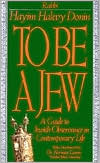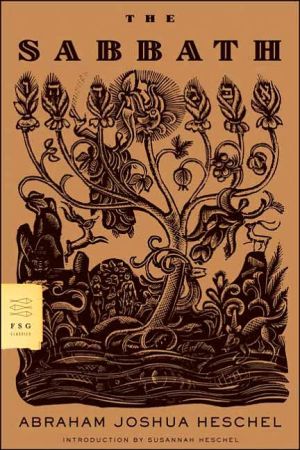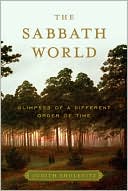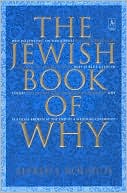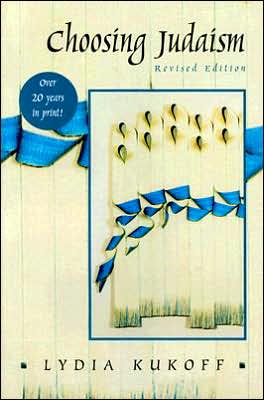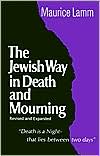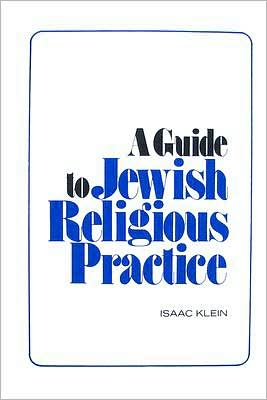To Be a Jew: A Guide to Jewish Observance
This indispensable volume has long been acknowledged as the classic guide to the traditional Jewish laws and customs as they apply to daily life in the contemporary world. The unique treasury of practical information and daily inspiration has long been acknowledged as the classic guide to the ageless heritage of Judaism—Jewish attitudes, Jewish philosophy, and Jewish law.\ \ This unique treasury of practical information and daily inspiration has long been acknowledged...
Search in google:
This indispensable volume has long been acknowledged as the classic guide to the traditional Jewish laws and customs as they apply to daily life in the contemporary world. The unique treasury of pract
Chapter One \ \ \ The Cornerstone of Judaism\ \ \ ISRAEL—THE PEOPLE\ \ \ The terms Hebrew, Israelite, and Jew have historically been used synonymously and interchangeably. The Bible refers to Abraham as Ibri (Hebrew), probably because he migrated from the other side (east) of the Euphrates River and Ibri means "from the other side." Israel was the alternate name of Jacob, the grandson of Abraham. Hence his twelve sons and their descendants became known as the children of Israel, or the Israelite Nation or People. Jew is derived from Judah, the son of Israel, the most prominent of the Twelve Tribes. This became the prevalent name for the entire people when the Judeans from the Kingdom of Judea survived the downfall of the Northern Kingdom of Israel in 722 B.C.E. when Ten Tribes were led into captivity. Thus today, the people are called Jewish, their faith Judaism, their language Hebrew, and their land Israel.\ This people, Israel, started life as one family tracing its antecedents back to Abraham, the Hebrew who lived approximately 3800 years ago. The monotheistic faith firmly held by Abraham, and the "Covenant with God" entered into by him and reaffirmed by his descendants, identified this family as the adherents of a special faith. The family did not claim exclusive rights to this faith, but on the contrary, were eager to attract others to it. As this God-intoxicated family and those who joined them in faith grew in number, accepting the Torah as their Divine Constitution, taking possession of the landpromised to them by the Master of the universe, they assumed the characteristics of a nation, a people speaking a common language, living within a specified geographic area, sharing common memories and a common destiny, and exercising the attributes of national sovereignty.\ On the basis of their origin, Jews everywhere have regarded themselves as members of a family, an expanded family to be sure, and oftimes a far-flung family, but a family nevertheless. Membership in this family derives from the mother. The child of any Jewish woman is thus considered to be a member of the family. But membership in the family has never been limited by birth. It has always been open to all, and those who share the faith of this family may be "adopted" into it. Thus, the convert to Judaism not only becomes a partner in faith with the children of Israel, but through faith, the proselyte himself becomes one of the children of Israel, sharing fully in its heritage and its privileges and assuming its burdens and tribulations. In accepting the Jewish faith, the proselyte thus joins the Jewish people or nation. In accepting the religious duties of the present, and in assuming t]he spiritual mission of the future, he also ties himself to the collective past.\ Although the natural tendency for any family is to be exclusive and to look inward, this particular family was never exclusive. In times of persecution it was sometimes forced to withdraw in self-defense, but generally it looked outward and reached out to the world at large. When the central sanctuary in Jerusalem was built, Jews saw it as a "House of Prayer for all peoples" (Isaiah 56:7, see also Kings 1 8:41-43).\ In the very emphasis upon the particular, this singular family reflected the noblest form of universalism. The universalism that permeates the faith of Israel is reflected not only in its theological formulations and in its visions of the future, but in the very composition of its people. This seemingly "exclusive" people includes those whose skins range from the lightest to the darkest in colors, and within it a broad range of cultural diversity is represented. Yet despite the diversity that exists among them and the multitude of languages they speak, Jews regard themselves as related, as true brethren stemming from a common Semitic family. Although it is religion which unites them and it is only on the basis of religion that newcomers are admitted into fellowship, this feeling of kinship is very strong—and the mystery deepens when we realize that even Jews who rebel against the faith and discard its religious beliefs and practices are still regarded as Jews, and generally themselves still feel the bonds of kinship.\ This sense of kinship felt by the Jewish people may be more of a "mystical" experience than a rationally definable one. Perhaps that is one of the reasons why Jews have never quite been able to fit into the convenient categories used by historians or sociologists to define nations, races, religions, and other social groupings. Except for the fact that the Jews obviously do not constitute a race (for race is a biological designation), the Jews are not just a religious faith, even though they are that; and they are not just a nation, even though they are that too, according to definitions of the term "nation." The problem is usually resolved by using the term "people" instead of either "faith" or "nation."\ This difficulty in categorizing the Jewish people may well be part of their uniqueness. It is a uniqueness which according to the believer was given its permanent stamp by the Divine command, "You shall be to Me a kingdom of priests and a holy nation" (Exodus 19:6).\ The Jewish people were once described in these poetic terms:\ There is a river in the ocean. In the severest droughts it never fails, in the mightiest floods it never overflows. The Gulf of Mexico is its fountain and its mouth is in the Arctic seas. It is the Gulf Stream. There is in the world no other such majestic flow of waters. Its current is more rapid than the Mississippi or the Amazon, and its volume more than a thousand times greater. Its waters as far out from the Gulf as the Carolina coasts, are of an indigo blue; they are so distinctly marked that their line of junction with the common sea-water may be traced by the eye. Often one-half of a vessel may be perceived floating in the Gulf Stream water, while the other half is in the common water of the sea—so sharp is the line and such the want of affinity between those waters, and such too the reluctance, so to speak, on the part of those of the Gulf Stream to mingle with the common waters of the sea. This curious phenomenon in the physical world has its counterpart in the moral. There is a lonely river in the midst of the ocean of mankind. The mightiest floods of human temptation have never caused it to overflow, and the fiercest fires of human cruelty, though seven times heated in the furnace of religious bigotry, have never caused it to dry up, although its waves for two thousand years have rolled crimson with the blood of its martyrs. Its fountain is in the gray dawn of world's history, and its mouth is somewhere in the shadows of eternity. It too refuses to mingle with the surrounding waves, and the lines which divide its restless billows from the common waters of humanity are also plainly visible to the eye. It is the Jewish people.\ Although a small people, separate and distinct, Israel has nevertheless not been a withdrawn people. Though standing alone, it has not stood aside. Jewish history is interlaced with that of every other nation and empire. "Jews ... have witnessed and taken part in more of the human career, they have recorded more of it, shaped more of it, originated and developed more of it, above all, suffered more of it, than any other people," wrote Ernest van den Haag. The history of the Jews has been a history of interaction with the rest of the world—although Western scholars reared in a Christian-dominated society have tended to perceive only myopically the role of the Jew and of Judaism in that history, and to treat condescendingly anything that related to Jews or to Judaism. Textbooks of history, sociology or philosophy rarely have anything significant to say about the Jewish people or Jewish thought after the beginning of the Christian era. The bias against Judaism and the Jews that was reflected for so long in the texts and the curricula of the Christian universities was bequeathed to the secular academic world even after theological influence waned and the institutions became secular. Even Jews who entered this academic milieu were subtly influenced by the existing bias and unquestioningly accepted it themselves. Generally ignorant of their own history and philosophy, they fell sway to the notion that serious Jewish thought beyond the Biblical period either did not exist or did not merit the concern of serious scholarship.\ Though denied, despised, rejected, persecuted, confined, and restricted through history, Jews and Judaism, the people itself and its sacred books, have nonetheless often set in motion forces that marked major revolutionary changes and advances in Western religions, in the natural and medical sciences, and in social philosophies. The contributions by individual Jews in every field of creative endeavor, in the advancement of human knowledge, in the elimination of suffering, in the development of commerce, have filled volumes. Judaism's traditional emphasis on social justice through social action has had a noticeable effect in contemporary times.\ For a people who have always been numerically insignificant, "the fewest of all the nations," ha-m'at mikol ha-amim to use the words of the Torah, to have compiled such a record of achievements, and to have been on the scene of world history for so long while surviving all attempts to assimilate it and even to annihilate it, something more must be involved than the capacities of the people themselves.\ The devout Jew looks upon that "something more" as a fulfillment of Divine prophecy that "through you and your descendants will all the families of the earth be blessed" (Genesis 28:14), and as a vindication of Israel's Covenant with God: "For you are a holy people unto the Lord your God, and you did God choose to be unto Him a treasured people from among all the peoples upon the face of the earth" (Deut. 14:2). The devout Jew accepts the status with humility and thanksgiving, seeing it as a yoke and a burden as well as a distinction. He sees himself as a servant of the Lord, ready to do His bidding at all times. Serving the Lord takes many forms: spending one's life studying Torah, faithfully observing the ritual and ethical commandments, struggling for justice and righteousness in society. The learned and observant Jew ignores none of the ways.\ Whatever the believing Jew may find himself doing in fulfillment of that role, and whatever apparent "smallness" or "insignificance" his existence may appear to have, for him there is cosmic significance and purpose in doing the bidding of the Lord.\ The skeptical Jew, on the other hand, who does not at all see himself as a servant of the Lord, is embarrassed by any reference to Israel's enjoyment of Divine favor or any notion of a special national mission. Such talk even on the part of non-Jews tends to embarrass him, and he is eager to repudiate all such notions. But his attempts at repudiating the meaning of Jewish history are invariably contradicted by history itself, which does not permit Jews to become "like all the other nations," to become merely another national entity among nations.\ We believe that the nations and peoples of the world have their Divine purposes and their assigned roles to fulfill, too, for God is the God of all the world, not just of Jewry. And we see our divinely ordained assignment as involving a unique role, one to which history itself bears witness. It implies a special purpose in life, a reason for our existence. That purpose is not to make Jews of all the world, but to bring the peoples of the world, whatever their distinctive beliefs may be, to an acknowledgment of the sovereignty of God and to an acceptance of the basic values revealed to us by that God. It is to serve as a means by which blessing will be brought to "all the families of the earth" (Genesis 12:3).\ (Continues...)\ \ \ Excerpted from TO BE A JEW by Rabbi Hayim Halevy Donin. Copyright © 1972 by Hayim Halevy Donin. Excerpted by permission. All rights reserved. No part of this excerpt may be reproduced or reprinted without permission in writing from the publisher. \ \ \ \
2001 ForewordPrefaceIntroduction3Pt. 1The Underlying CreedCh. 1The Cornerstones of Judaism7Ch. 2Halakha: The Jewish Way28Ch. 3The Reasons for the Commandments33Pt. 2The Daily Way of LifeCh. 4Kindness: A Means and an End41Ch. 5The Sabbath: An Island in Time61Ch. 6The Dietary Laws: A Diet for the Soul97Ch. 7Family Life: A Key to Happiness121Ch. 8Signs of the Covenant: Love and Reverence142Ch. 9The Synagogue: Where Jews Assemble183Pt. 3The Special Occasions of the YearCh. 10The Major Festivals209Ch. 11Passover218Ch. 12Shavuot239Ch. 13The Days of Awe242Ch. 14Succot250Ch. 15The Post-Biblical Holidays and Fast Days258Pt. 4The Special Occasions of LifeCh. 16Birth271Ch. 17Adoption and Conversion280Ch. 18Bar-Mitzvah and Bat-Mitzvah285Ch. 19Marriage287Ch. 20Divorce Proceedings292Ch. 21Death and Mourning296Epilogue / The Meaning of Return313Notes317Suggestions for Further Reading and Study: A Selected List319Index323
